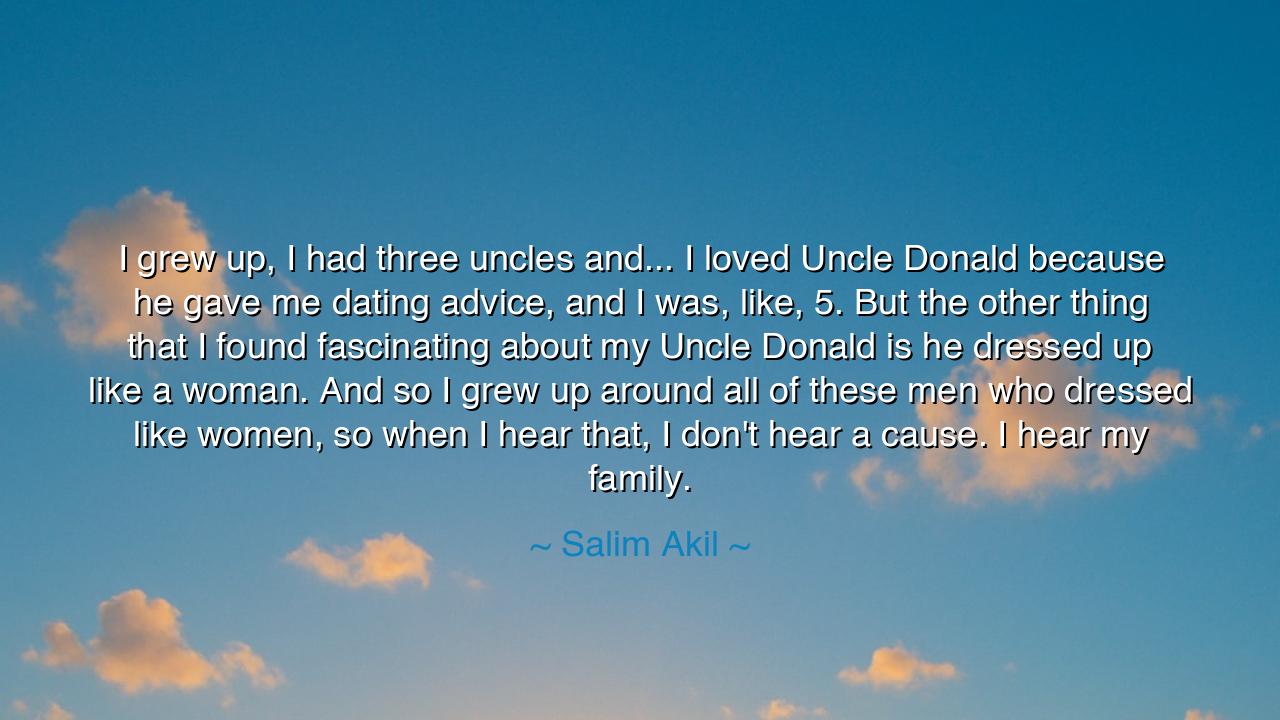
I grew up, I had three uncles and... I loved Uncle Donald because
I grew up, I had three uncles and... I loved Uncle Donald because he gave me dating advice, and I was, like, 5. But the other thing that I found fascinating about my Uncle Donald is he dressed up like a woman. And so I grew up around all of these men who dressed like women, so when I hear that, I don't hear a cause. I hear my family.






When Salim Akil spoke the words, “I grew up, I had three uncles and... I loved Uncle Donald because he gave me dating advice, and I was, like, 5. But the other thing that I found fascinating about my Uncle Donald is he dressed up like a woman. And so I grew up around all of these men who dressed like women, so when I hear that, I don't hear a cause. I hear my family,” he offered a revelation both tender and profound. Beneath his humor and warmth lies an ancient wisdom — that love, when genuine, sees no boundary of identity or form. The quote speaks of acceptance, of family, and of the divine truth that understanding begins not with ideology, but with experience. It is a call to remember that before the world divided humanity into categories, the heart knew only kinship.
In Akil’s reflection, the family becomes a temple of understanding, a living parable of how compassion is learned not through doctrine but through familiarity. As a child, he was surrounded by difference — men who dressed as women, identities that blurred the lines of society’s expectations — and yet, to him, it was natural. There was no shock, no rebellion, no cause to fight for, only love. The “cause”, he tells us, is an invention of distance — the political word that emerges when society forgets the intimacy of shared humanity. For him, there was no “otherness” to defend; there was only Uncle Donald, beloved and human. And thus, Akil teaches that phobia and prejudice are not inherited instincts, but learned fears.
The ancients too spoke of this truth. Lao Tzu, the sage of the Tao, wrote that “when there is no difference between ‘this’ and ‘that,’ the heart rests in peace.” In Akil’s childhood home, there was no “this” or “that” — only people. He grew up in a state of natural grace, untroubled by the distinctions that later divide adults. Like a garden where every flower grows in its own shape and color, his family revealed to him that diversity need not be defended; it simply exists. Only later does the world teach the mind to judge what the heart once embraced.
History, too, gives us examples of this truth rediscovered. Consider St. Francis of Assisi, who, in an age of rigid hierarchies, embraced lepers and beggars as his brothers. To him, they were not causes or symbols; they were reflections of the divine. When he kissed the leper’s hand, he did not perform an act of activism — he simply recognized kinship where others saw distance. Akil’s words carry that same sacred simplicity. To him, his uncles were not representatives of a movement, but expressions of the same human mystery. He reminds us that love, when uncorrupted by fear, sees only family.
And yet, the world has always feared what it does not understand. Distrust and phobia are not born of malice alone — they are born of unfamiliarity, of distance. The child who grows up surrounded by difference learns acceptance as easily as language. The one who grows up in isolation learns to fear what is foreign. Akil’s experience shows us that education begins not in classrooms but in hearts — that to raise a generation of understanding, we must first allow them to see humanity in all its forms, not as curiosities, but as kin.
The lesson of Akil’s story, then, is both simple and radical: love human beings before you label them. Do not let your compassion be conditional on understanding. You do not need to grasp another’s experience to honor their dignity. Just as the ancients believed that the soul was a spark of the divine, so too does every person carry light, even if it shines in a form unfamiliar to your eyes. When you strip away judgment, you return to what Akil calls “the natural grace” — the child’s ability to love without question.
So, my friends, let us unlearn the distance that the world has taught us. When you encounter someone who seems different, see them not as a stranger to be tolerated, but as a reflection of your shared human story. Do not hear a cause — hear a family. The ancients taught that all rivers return to the sea, and so too do all hearts return to love. Salim Akil’s words remind us of that eternal river within us — that beyond every boundary and every name, we are kin, woven together by the simple and holy thread of understanding.






AAdministratorAdministrator
Welcome, honored guests. Please leave a comment, we will respond soon